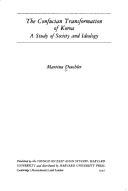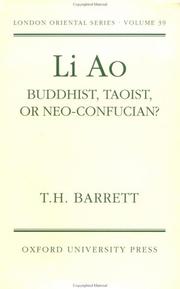| Listing 1 - 5 of 5 |
Sort by
|
Book
ISBN: 8971570113 Year: 1992 Publisher: 춘천 江原大出版部
Abstract | Keywords | Export | Availability | Bookmark
 Loading...
Loading...Choose an application
- Reference Manager
- EndNote
- RefWorks (Direct export to RefWorks)
Book
ISBN: 7561018169 Year: 1992 Publisher: 沈阳 辽宁大学出版社
Abstract | Keywords | Export | Availability | Bookmark
 Loading...
Loading...Choose an application
- Reference Manager
- EndNote
- RefWorks (Direct export to RefWorks)
Book
ISBN: 8842041246 Year: 1992 Publisher: Bari Laterza e Figli
Abstract | Keywords | Export | Availability | Bookmark
 Loading...
Loading...Choose an application
- Reference Manager
- EndNote
- RefWorks (Direct export to RefWorks)
Emotions --- Neo-Confucianism --- Religious aspects --- Confucianism

ISBN: 0674160886 9780674160880 Year: 1992 Volume: 36 Publisher: Cambridge Harvard university. Council on East Asian studies
Abstract | Keywords | Export | Availability | Bookmark
 Loading...
Loading...Choose an application
- Reference Manager
- EndNote
- RefWorks (Direct export to RefWorks)
Neo-Confucianism --- History. --- K9040 --- K9030.50 --- K9300.50 --- -Confucianism --- Philosophy, Chinese --- Korea: Philosophy and thought -- schools -- Confucianism --- Korea: Philosophy and thought -- history -- Chosŏn period (1392-1910) --- Korea: Social sciences -- social and cultural history -- Chosŏn period (1392-1910) --- History --- Korea --- Civilization --- -Confucian influences. --- Social life and customs --- -K9040 --- -Korea: Philosophy and thought -- schools -- Confucianism --- -Neo-Confucianism --- Confucian influences. --- Neo-Confucianism - Korea - History.

ISBN: 0197136095 9780197136096 Year: 1992 Volume: 39 Publisher: New York Oxford University Press
Abstract | Keywords | Export | Availability | Bookmark
 Loading...
Loading...Choose an application
- Reference Manager
- EndNote
- RefWorks (Direct export to RefWorks)
"Neo-Confucianism, the state sponsored orthodoxy of China's later empires, is now recognised as an important key to understanding China. This study looks at the roots of Neo-Confucianism in an age when Buddhism and Taoism had eclipsed the Confucian tradition in importance. Li Ao (c. 772-836 A.D.), though generally acknowledged as the forerunner of Neo-Confucianism, is still regarded as deeply influenced by Buddhism. The historical reasons for the creation of this image of Li Ao are examined, prior to a close investigation of the actual circumstances which shaped his Fu-hsing shu, 'Book of Returning to One's True Nature', the essay which had the deepest influence on the development of early Neo-Confucianism. Although common assumptions about Buddhist influence on Li Ao are questioned, the true importance of the essay emerges in the typically Chinese patterns of thought which it exhibits and which gave it an impact transcending the immediate circumstance that prompted its writing."--Jacket.
Buddhism. --- Neo-Confucianism. --- Taoism. --- Li, Ao, --- Philosophy. --- Religion. --- Buddhism --- Neo-Confucianism --- Taoism --- S12/0230 --- S12/0430 --- S13A/0310 --- Daoism --- Taouism --- Religions --- Tao --- Confucianism --- Philosophy, Chinese --- Buddha and Buddhism --- Lamaism --- Ris-med (Lamaism) --- China: Philosophy and Classics--Chinese philosophy: Sui and Tang --- China: Philosophy and Classics--Neo-Confucianists: general and Song (including lixue 理學) --- China: Religion--Buddhism: China --- Li, Wen gong, --- Ri, Kō, --- Li, Wen kung, --- Ri, Bun-kō, --- 李翱, --- 李翺,
| Listing 1 - 5 of 5 |
Sort by
|

 Search
Search Feedback
Feedback About
About Help
Help News
News